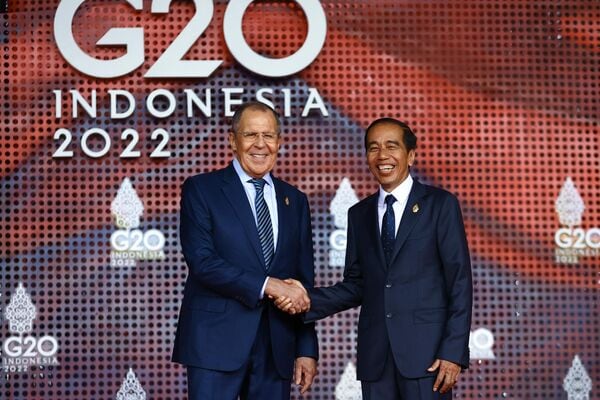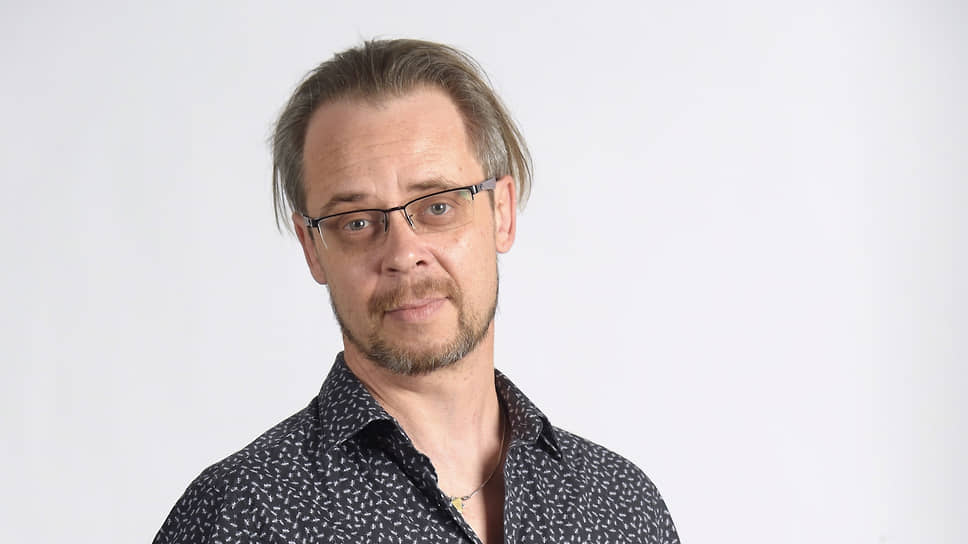Russia's President Vladimir Putin did not attend the recent G20 Summit in Bali Indonesia. Kremlin spokesperson Dmitry Peskov explained Putin's absence. "It was a decision by the head of state, related to his schedule, and with the need for his presence in the Russian Federation. Putin online presence at the G20 and APEC summits or his video message to the participants is not planned."[1] When German Chancellor Olaf Scholz and other leaders expressed regret that the Russian President did not attend the summit, Peskov responded. "The President of the Russian Federation does not regret this. Russia is represented at a worthy level by our Foreign Minister (Sergey Lavrov). The voice of Russia is heard. Russia is present at the proper level.[2]
Given the presence at the summit of Presidents Joe Biden and Xi Jing Ping, Putin's decision aroused comment in Russia's main commercial newspaper Kommersant. Three of the paper's regular columnists Sergei Strokan, Mikhail Gurevich and Maxim Yusin weighed in on Putin's no-show at Bali. Strokan and Gurevich essentially agreed with Putin's decision to absent himself and entrust Foreign Minister Lavrov with heading the delegation but for opposite reasons. Strokan believed that the G-20 had abdicated responsibility on the important issues that should have been discussed at the summit. It was futile to discuss things with the Western part of the G20, whereas Russia had already secured its interests with the non-Western wing. Therefore, Putin's presence was superfluous. Gurevich believed that Putin would have subjected himself to embarrassment at the summit given the present mood where Russia is no longer an active player, but a topic for discussion. Since Russia had no fresh ideas to offer, it could not expect to be taken seriously by the other world leaders. Maxim Yusin believes that Putin's decision not to attend the summit was a mistake. The summit offered Russia the opportunity to showcase its emerging ideology of multipolarism on an appropriate international stage, and the person to enunciate Russia's position was Putin and not Lavrov.
MEMRI presents the three columns below:

Indonesian President Joko Widodo greets Russian Foreign Minister Sergei Lavrov (Source: Ria.ru)
Kommersant foreign editor Sergei Strokan agreed in advance with Putin's decision to give the meeting a miss. The run up to the meeting showed the lack of seriousness by the participants. Meanwhile the non-Western wing of the G-20 basically indicated its preparedness to reject calls for boycotting Russia.
Strokan commented:[3]
Less than two weeks before the summit of the G20 leaders, scheduled for November 15-16 to be held at the Indonesian island of Bali, an increasing number of reasons for calling it "the most bizarre and unnatural action in international relations for 2022" (well, in what is left of these very international relations, considering the context of the Russian SVO [special military operation] in Ukraine).
This has never happened before in the history of the G20. On the one hand a critical mass of crisis factors had accumulated by November. Such words as "recession," "famine," "winter," and "energy crisis" flash in the headlines with increasing frequency. On the other hand, never before have the members of the G20 demonstrated such a clear lack of interest in global crisis management, which cannot be conducted by the collective West or the "global South" alone.
The date of Bali summit is approaching, but no one is talking about the agenda, as if there is no hurry. No one seems to care.
I'm worrying about something else though. All news about the G20 boils down exclusively to who will and who won’t attend, who will meet with whom and, if so, on what terms, who will ignore whom and why, and whether a collective photo will be taken.
The main topic was self-deleted, instead several lateral issues that concern everyone’s thoughts emerged: Biden-Xi, Biden-Putin (provided Putin will attend) and Ukraine. All the pre-G20 statements were confined to these subjects.
The Biden administration which has set a task this spring to exclude Russia from the G20, has already acknowledged its infeasibility. This was once again confirmed by John Kirby’s statement made this week regarding the fact that Washington is not demanding for Indonesia to withdraw its invitation to Moscow, and that it won’t meddle in any way in shaping the participants’ list.
And only the Ukrainian side, which has yet to grasp that the US concept on Russia’s participation in the G20 summit has already changed, is stubbornly calling for the G20 to campaign for Moscow’s exclusion. "Putin has openly admitted that he has ordered strikes on Ukrainian civilians and energy infrastructure... He cannot be allowed to sit at the same table with the world leaders," Foreign Ministry spokesman, Oleg Nikolenko admonished world leaders.
Thus, Ukraine, which is not a G20 member and which was invited to Bali at the US' insistence, has no intentions to be a guest with a single-entry ticket, or a timid pupil. In the G20, it positions itself as a confident teacher, trying to carry aloft the banner of a global campaign against Russia.
As for Russia, since the preparations for the G20 summit commenced it has, on the one hand, entered into an even greater clinch with the West and, on the other hand, significantly strengthened its ties with the "non-Western wing" of the G20, i.e., China, India, Brazil, Turkey, Saudi Arabia and the Indonesian presidency.
The decisions passed shortly before the G20 summit to establish a gas hub in Turkey, or to decrease oil production within the framework of the OPEC+ agreement demonstrated that one part of the G20 is increasingly taking the initiative, believing that there is no opportunity to coordinate this with the "Western wing" of the G20. In this situation, the G20 is increasingly taking the role of a tools of global hybrid warfare waged via means of diplomacy, although it would be more worthwhile to negotiate, rather than fight.

Sergei Strokan (Source: Yapolitic.ru)
Mikhail Gurevich, like Strokan, believed that Putin acted wisely by staying away, because his presence would only have caused embarrassment to Russia whose position had deteriorated in the international arena from an active participant to a mere topic of discussion. Gurevich wrote:[4]
The G20 meeting in Indonesia started with abandoning a joint photo of the participants due to the unwillingness by a number of leaders to appear in the same photo with Russia’s representatives. And this is just the beginning. Great Britain and the EU have already announced that they will boycott our delegation’s speeches and urged everyone to join their initiative.
Against the backdrop of such news, it became clear why Vladimir Putin refused to participate personally, or even via tele-format. Instead, he sent Sergei Lavrov, who over the past year acquired quite a vast experience in addressing half-empty halls. Let’s recall that in July the minister even left the G20 meeting of foreign ministers prematurely, and a similar move this coming week won’t be a surprise.
Despite the fact that the Kremlin continues to claim the support of the majority of planet’s inhabitants, in reality, everything looks, to put it mildly, not that definite. Naturally, they will talk a lot about Russia during the Bali summit and in detail. Except that we, ourselves, in these discussions have been transformed from an active participant to an object of discussion.
Other states are ready to peddle relations with Moscow for their own interests. Many analysts predict that the dialogue between Chinese President Xi Jinping and the US President Joe Biden will be conducted precisely in this vein. Will the Chinese leader be able and willing to defend Moscow’s stance? Or will he trade his support for some resolution of trade problems with Washington? This is one of the main intrigues of the summit.
However, the most active seller [of Russian ties] will, probably, be Recep Tayyip Erdogan. Given that the declared agenda of the forum will be overcoming of the food and energy crises, the Turkish leader will be able to act practically as an authorized Russian representative. In contrast to Russia, no one blames him for introducing these global problems. After all, the Turks are saving the world from hunger by persuading the Kremlin to extend the grain deal, and they are preparing to become a new energy hub too.
Naturally, I would like to see Russia’s voice heard in Indonesia without intermediaries, i.e., directly. After the SCO meeting in Samarkand, in September of this year, it seemed that this summit would bring a breakthrough in the peaceful settlement of the Russo-Ukrainian conflict. But it seems that Moscow obviously lacks fresh ideas for talks, neither with Ukraine, nor with Europe, nor with the US. And without ideas, there is absolutely nothing to talk about with unfriendly partners.
Although, there is another item on the agenda, on which literally the entire world awaiting our delegation's presentation. According to the preliminary draft of the G20 statement, the leaders of the world’s largest economies are planning to discuss the use or any threat to use nuclear arms.
One can only hope that Sergei Lavrov will be able to withstand provocation and state, in his calm diplomatic tone, that a nuclear winter won’t happen on our initiative. He knows how to do it.

Mikhail Gurevich (Source: Kommersant.ru)
Maxim Yusin was the outlier amongst the trio because he felt that Putin's presence was needed in Bali in order to make Russia's case and give concrete expression to Russia's multipolarism that has become the cornerstone of state ideology. He wrote:[5]
At the G20 summit that opened in Indonesia, the topic of Russia is one of the main, if not the main topic, but it is often discussed without Russia's participation itself. The reason for this is the downgraded level of the Russian delegation, with the absence of President Vladimir Putin at the forum. Meanwhile, the construction of a multipolar world, in which Moscow sees itself as one of the poles, has recently become almost the main cornerstone of state ideology.
[This applies] to interaction with alternative centers of power as well, with those powers that do not belong to the collective West and are ready to stand up to it, by defending their national interests, including the need to cooperate with Russia, despite US-European sanctions.
Precisely the leaders of these states (China, India, Turkey, Saudi Arabia, Indonesia) are present at the summit. In the current international situation, the G20 has remained one of the few formats where they are ready to listen to Moscow, where at least half of the participants refuse to boycott it.
It would seem an ideal tribune for declaring one's goals and principles, pushing back against the West, developing anti-colonial theses, and trying to win over the leaders of the East and the South. And besides, to communicate tete-a-tete with the leaders of those states on which Russia largely depends today. For example, pertaining to energy supplies, organizing parallel imports, overcoming trade blockades and international isolation.
But Vladimir Putin did not fly to Indonesia. The chance was missed.
In explaining the reasons for the refusal to participate in the summit, the Kremlin mentioned important circumstances that require the president to stay at home. Other arguments cited these days include a possible threat to the safety of the first person and an unwillingness to become the object of a collective obstruction to which the leaders of Western countries were going to subject the Russian leader in Indonesia. It is difficult to say how justified these fears were, but the result is obvious. At the G20 summit, Russia is not represented at the highest level. A multipolar world is being built without it.





